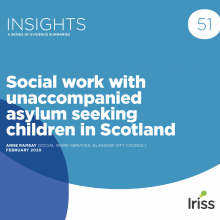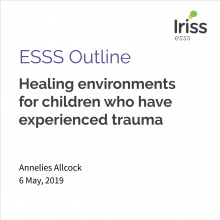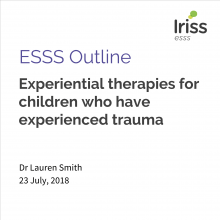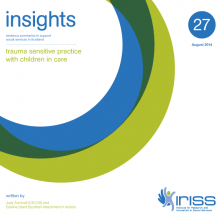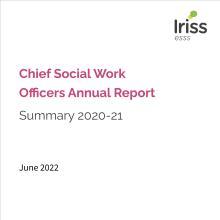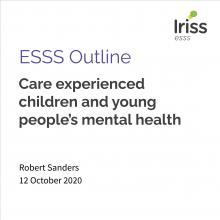Introduction
This summary provides an overview of recent evidence relating to:
Covid-19: Stress, anxiety, and social care workers mental health
About the evidence presented below
We searched for academic research and grey literature using a wide range of search terms including: social care, social workers, stress, burnout, anxiety, mental health, resilience, health and social care, wellbeing and Covid-19.
As Covid-19 is a new phenomenon the quality of evidence in the available literature is relatively low, but does contain valuable observations and suggestions for professionals working in social care.
Accessing resources
We have provided links to the materials referenced in the summary. Some materials are paywalled, which means they are published in academic journals and are only available with a subscription. Some of these are available through the The Knowledge Network with an NHS Scotland OpenAthens username. The Knowledge Network offers accounts to everyone who helps provide health and social care in Scotland in conjunction with the NHS and Scottish Local Authorities, including many in the third and independent sectors. You can register here. Where resources are identified as ‘available through document delivery’, these have been provided to the original enquirer and may be requested through NHS Scotland’s fetch item service (subject to eligibility).
Where possible we identify where evidence is published open access, which means the author has chosen to publish their work in a way that makes it freely available to the public. Some are identified as author repository copies, manuscripts, or other copies, which means the author has made a version of the otherwise paywalled publication available to the public. Other referenced sources are pdfs and websites that are available publicly.
Background
Psychological reactions to previous pandemics such as influenza and SARS in 2003 have included several psychiatric comorbidities and maladaptive behaviours such as anxiety, depression, panic attacks, emotional distress and defensive responses. People who are prone to psychological problems are especially vulnerable (Cullen, 2020; Shah, 2020).
Almost certainly Covid-19 will be no different. It has caused substantial disruption to the lives of people, the rapid spread and high mortality rate already having a major impact on society, the economy, and the provision of health and social care. Preliminary evidence suggests that symptoms of stress, anxiety and depression, and post-traumatic stress disorder later are likely reactions (Cullen, 2020; Rajkumar, 2020).
On an individual / personal level the fear of personal infection, or infection of friends and family members, sits alongside the potential toll of isolation and restricted movement on mental health and well-being, social functioning, and work (Thombs, 2020).
All of these concerns are amplified by the constant stream of information and misinformation from news, the internet and social media (Cole, 2020), coverage which can blur the lines between home and work (Walton, 2020).
A Chinese study from January and February 2020 found that 54% of respondents rated the psychological impact of the Covid-19 outbreak as moderate or severe; 29% reported moderate to severe anxiety symptoms; and 17% reported moderate to severe depressive symptoms (Cullen, 2020).
Public Health England data shows over 4 in 5 adults are worried about the effect it is having on their life, with more than half saying it affected their wellbeing and nearly half reporting high levels of anxiety. More than 45% of Scots feel lockdown measures have had a negative impact on their mental health (Third Force News, 2020a).
Social care and mental health
Three groups are at particular risk of psychological symptoms (Inchausti, 2020):
- health and social care workers responding to the pandemic and their patients
- individuals diagnosed with Covid-19, losing family and loved ones to the illness, or affected by prolonged social distancing
- individuals with existing mental health conditions exacerbated by current circumstances
Social care workers can often be all three of these.
Social care is already a stressful occupation and arguably Britain was facing a health and care crisis before Covid-19 (Community Care, 2020b).
Workforce shortages are common across almost every health and care profession. Social care had a shortage of 110,000 people in 2018. Research from 2018 showed half of all care workers were paid below the real living wage. They are also vulnerable to workplace exploitation – such as sleep-ins paid below the minimum wage, unpaid travel time, and insecure contracts. Progression, training and bargaining power are also poor. The results of this are high rates of mental illness, burnout, overwork and poor morale (IPPR, 2020).
This situation will be worsened by Covid-19.
The Institute of Public Policy Research report, Care Fit For Carers, found the pandemic is having a ‘severe impact’ on the mental health of healthcare workers, with many experiencing stress, anxiety, bereavement or trauma. In YouGov polling, half of staff cited mental health as having been impacted by Covid-19, ahead of worries about family safety, and the ability to ensure patient or service-user safety because of a lack of testing and personal protective equipment (IPPR, 2020).
A survey, commissioned by the GMB Scotland trade union, asked people who work in the social care sector about their mental health. Four in every five carers said their mental health has already been damaged by their work. The same number said they have not been offered mental health support by their employer (ITV News, 2020).
Studies from previous pandemics, and from countries recently affected by Covid-19 show similar results - higher prevalence of sleep disorders, anxiety, depression, obsessive compulsive disorder, and post-traumatic stress disorder (Conversano, 2020; Inchausti, 2020; Rodolfo, 2020; Zhang, 2020) with emotional distress experienced at the onset, during, and after the outbreak of the infection (Shah, 2020).
The most common symptoms included recurrent and intrusive thoughts about the events experienced during patients care giving, difficulty in falling asleep, in memory and concentration, hyper-vigilance and hyper-arousal, anger outbursts, mood dysregulations, avoidance of working activities and places, alcohol / drug abuse, numbing, isolation and psychological detachment (Conversano, 2020; Jun, 2020).
It should be highlighted that healthcare, not social care, is often the focus of policy, reporting and studies. There is a need to provide the same support, and to protect rights and ethical practice in social care and social workers (Community Care, 2020b).
And often forgotten about is the crucial role of unpaid carers in the health and social care system. A study by Carers Scotland found 78% of unpaid carers are providing an average of 10 additional hours care per week, often for loved ones with complex health conditions and disabilities - without any hope of a break. Almost 40% of this is because local care and support services have been reduced or closed. Almost 25% are providing more care because they are worried about paid staff having contact with the person they care for (Third Force News, 2020b).
Causes and outcomes
Covid-19 is exerting unprecedented pressure on health and social care services, with particular challenges for frontline staff. Care providers will not only feel the burden of their professional duty, with long hours, often understaffed and insufficient time for recovery, but anxiety around shortages of personal protective equipment and the risk of infection. This sits alongside the fear of spreading the virus to their families (Cole, 2020; Jun, 2020; Rakjumar, 2020).
Even the most resilient staff members, experienced in breaking bad news to relatives may be overwhelmed by having to do this many times a day for weeks on end, especially if they have feelings of guilt on the care they’re able to provide. In these circumstances moral injury and burnout may affect mental health (Greenberg, 2020; Walton, 2020).
Interviews with American healthcare professionals held during the first week of the Covid-19 pandemic explored 3 key concerns: what health care professionals were most concerned about, what messaging and behaviours they needed from their leaders, and what other tangible sources of support they believed would be most helpful to them (Shanafelt, 2020).
These discussions consistently centred on 8 sources of anxiety:
- access to appropriate personal protective equipment
- being exposed to Covid-19 at work and taking the infection home to their family
- not having rapid access to testing if they develop symptoms, and fear of spreading infection at work
- uncertainty around organisational support, particularly if taking care of their personal and family needs
- access to childcare during increased work hours and school closures
- support for other personal and family needs as work hours and demands increase (food, hydration, lodging, transportation)
- being able to provide competent medical care if deployed to a new area
- lack of access to up-to-date information and communication
These are much the same issues identified across the social care sector as causes of stress and anxiety among workers.
It is crucial to manage workplace stress effectively given the close links to a range of physical and mental health problems, reduced work performance and absenteeism.
The workplace
Studies from health care workers providing care for patients with Covid-19 found substantial levels of anxiety, stress, depression and insomnia (Wu, 2020b). This is exacerbated by difficulties managing work when colleagues are self-isolating or sick. There is little reason to assume the same does not apply to social care workers providing direct care too.
Staff who isolate or are quarantined feel guilty about leaving front lines understaffed, and about possibly contaminating co-workers, patients and their own families (Walton, 2020).
Many workers claim they feel forgotten (Nursing Times, 2020). The British Association of Social Workers called for more clarity on policy, protocols and resources for safe work in all contexts. This includes protecting workers who have, or care for anyone, with underlying health conditions from carrying out client-facing work. Shortages of personal protective equipment, lack of and delays to testing, putting service users, themselves and their families at risk (Community Care, 2020b; Evening Telegraph, 2020) can provoke negative feelings such as anger, frustration, and helplessness.
Having to provide care in places such as care homes, often for very elderly or severely unwell patients, with constrained or inadequate resources can be a major source of workplace stress for social care workers.
Carers and managers, particularly those in care homes, have to deal with the sudden deaths of people they’ve got to know and bonded with over time. This is not in itself unusual. But the probability of PTSD is increased with much higher incidences of death, the likely inexperience of dealing with a pandemic, combined with guilt from potentially spreading the virus, or what they may see as being unprepared or poorly unequipped to deal with the pandemic (ITV News, 2020; Trabucchi, 2020).
Feelings of guilt and helplessness may present themselves in other areas of social work, such as children and families services, where there are major concerns on how to safeguard families from abuse, neglect and domestic violence if they can’t meet with social workers (Community Care, 2020a).
This sense of helplessness - “the conviction that everything that can be done has been done, which results in an inability to mobilize energy and effort” - and hopelessness - “the feeling that any effort aimed at constructive change is doomed before it is even attempted” - can further compromise mental wellbeing (Shaw, 2020).
Despite talk of extra Personal Protective Equipment, three in every five care workers are still concerned by the lack of PPE in work (ITV News, 2020).
With almost a quarter of the adult social care workforce on zero-hours contracts job security remains an issue within social care. This is compounded by the economic and financial uncertainty brought about by Covid-19 (Department for Health and Social Care, 2020).
Despite this build up of worry, stress and grief more than half in a GMB Scotland survey said they can’t get time away from work to access mental health support when needed (ITV News, 2020).
Stress
Stress is associated with both short and long-term health problems. It can promote damaging behaviours such as excess alcohol consumption and drug misuse. It’s also known to produce metabolic changes relating to cholesterol levels, obesity and an increased risk of coronary heart disease, as well as having other knock-on effects such as depression and poorer immune function. It’s therefore important to acknowledge the health risks of social work, a profession that has long been associated with stress, depression and burnout (Community Care, 2016).
Burnout
Some health and social care workers will struggle to manage their own physical and mental healthcare needs (alongside those they care for, including family members), particularly when ways to alleviate or prevent work-related stress and anxiety are difficult to maintain.
Covid-19 is causing workload pressures, multiple stressors and traumatic experience. If annual leave is postponed or cancelled, if understaffing due to absences means longer, more frequent working patterns, there is a risk of staff burning out (Shaw, 2020).
Burnout - where coping methods are worn away until they reach physical, emotional, and mental exhaustion - is a major occupational problem among health and care providers (Sultana, 2020; Wu, 2020b). Like stress, this can lead to the use of harmful coping strategies. There is also the danger that if left untreated or unsupported these symptoms may evolve into post-traumatic stress disorder or other chronic conditions.
More than half of care workers in this survey said they feel overwhelmed managing their caring responsibilities during the outbreak and are worried about burning out in the coming weeks (Third Force News, 2020b).
Moral injury
Some have emphasised moral injury - “psychological distress that results from actions, or the lack of them, which violate someone’s moral or ethical code” - as a priority for health and social care workers (Cole, 2020). This can include the potential for carrying and spreading the virus, and illness or death caused by lack of resources. Through moral injury, frontline staff are likely to develop negative thoughts and emotions around themselves or others (e.g. guilt). While it’s not a mental illness, these symptoms can lead to mental health difficulties and conditions like depression or post traumatic stress disorder (Walton, 2020).
Friends and family
Another coping mechanism which would normally help with worker stress can be a cause of additional worry here (Trabucchi, 2020). People fear for their own families, that they will spread the virus to them, particularly if they live with or look after older people, children, or others with underlying conditions.
For some social care staff there’s the added burden of having to separate themselves from families, in some cases living in care homes, to protect both residents and families from spreading the virus.
Longer-term impact
Mental health symptoms persisted in previous pandemics, long after the outbreak, increasing the risk of worsening mental and physical health (Conversano, 2020), particularly for those dealing with traumatic events such as death, ongoing health threats, and unstable employment. These people may express symptoms of post-traumatic stress disorder, depression or complicated grief disorder months after the pandemic has peaked (Inchausti, 2020; Shah, 2020).
An additional dropout of healthcare workers should be expected. China and Italy have already faced a loss of healthcare personnel, not just due to infection with Covid-19, but also the consequences of acute stress, frustration and isolation (Godderis, 2020).
Solutions
It’s important to recognise that acute stress reactions can be normal for frontline staff, and that they usually resolve themselves relatively quickly (Cole, 2020; Walton, 2020) through resilience or coping strategies. For many though, these coping strategies can become unhelpful, experiences can pose a risk for the emergence of mental health difficulties, or exacerbate existing ones.
The World Health Organization formally recognised this risk to healthcare workers (Cullen, 2020). And since it’s likely the demands on health and social care will continue for the foreseeable future what can be done to manage anxiety and stress, and help prevent burnout, depression and post-traumatic stress disorder?
Interviews with American healthcare professionals held during the first week of the COVID-19 pandemic explored their main concerns, all of which could be broadly seen as: hear me, protect me, prepare me, support me, and care for me (Shanafelt, 2020).
The British Psychological Society (BPS, 2020) and others highlights key ways to supporting frontline staff:
- Visible leadership
- A communication strategy
- Consistent access to physical safety needs
- Human connection and methods of pre-existing peer support
- Psychological care for patients and families
- Normalise psychological responses
- Formal psychological care in stepped ways
- Innovate to implement psychological care, coordinated and consistent with organisational policies and principles of compassionate care
- Core NHS, organisational and professional values in making decisions
- Take care of yourself and pace yourself – this is a marathon, not a sprint
What the evidence shows is that early intervention makes a huge difference when it comes to bereavement counselling and treatment for PTSD (ITV News, 2020) and support for staff must be phased as the pandemic unfolds (Cole, 2020).
From a workplace perspective support might include increasing awareness of stress and burnout, promoting mindfulness and self-care practices, providing mental health services, using digital technologies to address stress and deliver mental health support, and improving organisational policy and practice (Sultana, 2020).
Peer support
Most people find that support from colleagues and manager is the first line of defence in protecting mental health. Using processes like “buddying” systems, shift-end supervisor-led reviews (Tracy, 2020), or discussions based on Schwarz rounds from healthcare, can provide a forum for staff from all backgrounds to safely discuss the emotional and social challenges of caring for patients (Walton, 2020).
Peer support groups have been beneficial for the psychological and emotional wellbeing of nurses and doctors (Cole, 2020).
These should include a briefing on moral injuries, as well as an awareness of other causes of mental ill health and what to look out for (Walton, 2020).
Self-care
Research highlights the importance of self-care in helping reduce anxiety, stress and burn-out. Even basic self‐care such as rest and nutrition can help support improved quality of life, physical and mental wellbeing, and achieving a healthy work / life balance (Iriss, 2020b; Jun, 2020).
While it’s important to get timely, accurate and factual information from a reliable source, over-exposure to social media, news and media coverage can cause stress and anxiety. It’s advised to do this no more than a couple of times a day (Iriss, 2020a).
Resilience
There are many definitions of resilience - “the interactive and dynamic process of adapting, managing, and negotiating adversity” - but they typically refer to resourcefulness, flexibility, effective coping and the ability to bounce back from difficulty (Community Care, 2020a).
Resiliency emphasises: emotional literacy / intelligence, empathy, supervision and organisational support, optimism and hope, self-compassion and self-care.
Previous pandemics have led to the incorporation of resilience training for medical practitioners in preparation for future pandemics (Shah, 2020).
The need for social workers to develop the resilience required to help them manage stress effectively and provide a high quality service is widely recognised (Community Care, 2020a). The British Association of Social Workers has guidance on maintaining resilience during the pandemic (BASW, 2020):
- Coping with uncertainty - While things are changing so rapidly, it is helpful to take each day, hour or moment as it comes.
- Thinking positively - It can be useful to remember that challenging situations often bring about some kind of change, and change is neither wholly positive nor wholly negative.
- Being hopeful - Striking a balance between being overly optimistic and imagining the worst.
- Distinguishing needs from wants - Focusing on what is lacking can increase frustration. It can help to distinguish between what we need and what we want.
- Managing expectations - Seek clarity from your organisation about what is expected of you and be as clear with service users and other professionals as you can about the boundaries of your role and what you can realistically offer in the circumstances.
Some strategies such as mindfulness, cognitive behavioural techniques, reflective practice have been found to be effective, but it should be noted that while potentially beneficial, the evidence base for some of these associated activities isn’t particularly strong (Tracy, 2020).
It’s also important to reduce the stigma and increase awareness of and screening for depression and post-traumatic stress disorder among health and social care professionals, and put systems in place to deal with them. Organisations should provide information on managing stress, reducing burnout, and identifying mental health support services (Dewey, 2020; Jun, 2020; Wu, 2020b).
Digital health
The lockdown and social distancing have made face-to-face treatment and psycho-social support difficult (Wu, 2020b).
Psychiatric treatment should still be offered and accessible to affected workers, but with an emphasis on online technology, digital platforms, and apps (Shah, 2020).
For example, the UK Department of Health and Social Care has launched a text messaging support service and a Care Workforce app for the entire adult social care workforce in England. It’s designed to work as a single digital hub with access to learning resources and practical advice and support for mental wellbeing.
Scotland has the PRoMIS National Wellbeing Hub, part of which gives health and social services workers access to NHS accredited mental health apps Daylight and Sleepio to help with mental wellbeing, anxiety, stress, resilience and sleep loss.
There is also research ongoing at universities, including Stirling (News Medical, 2020) which is looking at supporting and safeguarding carers and support workers during the pandemic, and assessing the impact on them.
Workplace
Where possible organisations should provide psychological support. Drop-in sessions with psychologists / psychiatrists have been recommended based on evidence from previous outbreaks (Walton, 2020).
Workplace culture and logistics can play an important role safeguarding mental health. Work schedules should promote physical resilience (Dewey, 2020). Shorter working hours, regular rest periods, rotating shifts should be considered where possible (Ho, 2020).
A safe working environment, confidence in infection-control measures with sufficient protective supplies also plays a big part in reducing stress and anxiety (Ho, 2020; Liu, 2020).
Communication
Information can help reduce anxiety (Wu, 2020a). Organisational leaders should communicate current best practices clearly and compassionately. A previous study during the SARS outbreak highlighted clear, frequent hospital communication, without being overly reassuring, as helpful to address the fears and uncertainties of health care workers (Wu, 2020a).
Policy recommendations
The IPIR (2020) makes policy recommendations, looking for guarantees around safety, accommodation, mental health, pay and care for NHS and social care workers.
- suitable provision of PPE for staff, and consistency in government communications around supply and standards.
- ensuring suitable, secure accommodation and housing, and tackling rental arrears.
- full roll out of mental health provision as a priority.
- sick pay and income support, a covid-19 service pay award, and minimum pay standards.
- full support for health and care staff who are the main carer for a vulnerable friend, family member or loved one.
Challenges
A major barrier to the effective use of research on Covid-19’s effects on mental health is likely to be the large number and quick publication of studies of variable quality, rather than a lack of evidence. The challenge will be rapidly separating informative evidence from evidence that may be less useful or misleading due to poor methodology, inadequate reporting, or both (Thombs, 2020).
There is a risk attached to early crisis responses, that interventions and frameworks will be rushed out, and though well intentioned may not be evidence based (Inchausti, 2020).
There are a number of barriers to using conventional evidence-based approaches to mental health support just now, particularly with the impact of social distancing on face-to-face therapy. There will also be a range of different psychological responses and mental disorders to deal with, brought about by the unusual circumstances of a pandemic (Yang, 2020).
Studies have also shown reluctance from health and care workers to admit there is anything wrong, or to take part in interventions (Cole, 2020; Yang, 2020). Staff were more focussed on practical support and suggested “more rest without interruption and enough protective supplies” rather than psychological support.
Next steps
As the pandemic plateaus, and we begin to emerge from social isolation and distancing, mental health symptoms such as stress, anxiety, insomnia and PTSD are expected to present across the health and care systems (Inchausti, 2020). The literature emphasises the importance of not starting formal psychological treatments quickly and without careful assessment, including active monitoring.
The National Institute for Health and Care Excellence recommends “active monitoring” of staff to ensure that the minority who become unwell are identified and assisted to access evidence based care. Supervisors should ensure that time is made to reflect on and learn from the extraordinarily difficult experiences to create a meaningful rather than traumatic narrative (Greenberg, 2020).
Resources
Iriss (2020) Resilience resources for social work and social care workers (website)
Social Work Scotland, Iriss and the Scottish Social Services Council (SSSC) have worked in partnership to draw together helpful resources for social service practitioners and their organisations to support them to think about and promote wellbeing and resilience.
LGA COVID-19 social care staff wellbeing (website)
The LGA and NHS England and Improvement have produced a comprehensive pack of wellbeing information and resources to help health and care managers support the wellbeing of staff who may be working under exceptional pressure to do their jobs while at the same time dealing with their own personal situations and emotions.
Mental Health Foundation How to look after your mental health during the Coronavirus outbreak (website)
The Mental Health Foundation is part of the national mental health response during the coronavirus outbreak.
NHS Inform Mental Health (website)
Self-help guides intended for people with mild-to-moderate symptoms of anxiety, depression and stress, traumatic events and PTSD.
NHS NES Psychosocial mental health and wellbeing support for staff (website)
Key resources to support the mental health and wellbeing of you and your staff members. Includes sections on managing stress, coping and resilience.
PROMIS National Wellbeing Hub (website)
The Hub is a partnership between national, local and professional bodies in Scotland with a shared passion for looking after the emotional and psychological wellbeing of our country’s health and social services workers
Social Care Wales Your health and well-being (website)
A resource to support the health and well-being of social care workers during the coronavirus pandemic.
SSSC (2020) Workforce support and wellbeing during the COVID-19 outbreak (website)
This guide highlights principles and strategies which are based on good, reliable science and evidence that can help you manage the ongoing stress as effectively as possible, and summarises the best available knowledge in this area at the current time with associated relevant links should you wish more information.
References
BASW (2020) Weathering the Storm: How can social workers maintain their emotional resilience during the coronavirus pandemic? (website)
BPS (20202) The psychological needs of healthcare staff as a result of the Coronavirus pandemic (pdf)
Cole, C (2020) Adapting IAPT services to support frontline NHS staff during the Covid-19 pandemic: The Homerton Covid Psychological Support (HCPS) pathway The Cognitive Behaviour Therapist, 13, E12 (open access)
Community Care (2016) How stress impacts social workers – and how they’re trying to cope (website)
Community Care (2020a) Developing emotional resilience and wellbeing: a practical guide for social workers (pdf)
Community Care (2020b) Covid-19: how has social work responded to the coronavirus crisis? (website)
Conversano, C (2020) Psychological distress among healthcare professionals involved in the Covid-19 emergency: vulnerability and resilience factors Clinical Neuropsychiatry, 17 (2), 94-96 (open access)
Cullen, W (2020) Mental health in the Covid-19 pandemic QJM: An International Journal of Medicine (open access)
Department for Health and Social Care (2020) COVID-19: our action plan for adult social care (website)
Dewey, C (2020) Supporting Clinicians During the COVID-19 Pandemic Annals of Internal Medicine (open access)
Evening Telegraph (2020) Union chiefs raise concerns over mental health of social care workers in Dundee (website)
Fessell, D (2012) Coronavirus Disease 2019 (COVID-19)and Beyond: Micropractices for BurnoutPrevention and Emotional Wellness American College of Radiology (pdf)
Godderis, L (2020) COVID-19: a new work-related disease threatening healthcare workers Occupational Medicine (open access)
Greenberg, N (2020) Managing mental health challenges faced by healthcare workers during covid-19 pandemic BMJ 2020; 368 :m1211 (open access)
Ho, CS (2020) Mental Health Strategies to Combat the Psychological Impact of COVID-19 Beyond Paranoia and Panic Ann Acad Med Singapore. 2020;49(3):155‐160 (open access)
Holmes, EA (2020) Multidisciplinary research priorities for the COVID-19 pandemic: a call for action for mental health science Lancet Psychiatry April 15, 2020 (open access)
Holyrood (2020) New mental health apps provided to NHS staff (website)
Inchausti, F (2020) Psychological intervention and COVID-19: What we know so far and what we can do (open access)
Institute for Public Policy Research (2020) Care Fit For Carers: Ensuring The Safety And Welfare Of Nhs And Social Care Workers During And After Covid-19 (pdf)
Iriss (2020a) Mental health and wellbeing (open access)
Iriss (2020b) Self-care in health and social care (open access)
ITV News (2020) Mental health 'damaged' in majority of Scottish coronavirus carers (website)
Jun, J (2020) Clinician Mental Health and Well‐Being During Global Healthcare Crises: Evidence Learned From Prior Epidemics for COVID‐19 Pandemic Worldviews on Evidence‐Based Nursing (open access)
Liu, Q (2020) The experiences of health-care providers during the COVID-19 crisis in China: a qualitative study The Lancet Global Health (open access)
MQ: Transforming Mental Health and the Academy of Medical Sciences (2020) Survey results: Understanding people’s concerns about the mental health impacts of the COVID-19 pandemic (pdf)
News Medical (2020) New app to be developed to protect carers, support workers during COVID-19 pandemic (website)
NHS Scotland (2020) Staying Safe & Well: A Self Care Guide for Staff looking after patients with Coronavirus (pdf)
Nursing Times (2020) Social care staff on coronavirus frontline ‘feel forgotten’ (website)
Rajkumar, RP (2020) COVID-19 and mental health: A review of the existing literature Asian Journal of Psychiatry Volume 52, August 2020 (open access)
Rodolfo, R (2020) Mental health outcomes among front and second line health workers associated with the COVID-19 pandemic in Italy medRixiv (open access)
Ross-shire Journal (2020) NHS Highland health and social care staff to receive mental health support during Covid-19 coronavirus pandemic thanks to new project being led by researchers at the University of the Highlands and Islands (website)
Santarone, K (2020) Preserving mental health and resilience in frontline healthcare workers during COVID-19 The American Journal of Emergency Medicine (open access)
Scottish Government (2020) Unique support for health and social care (website)
Shanafelt, T (2020) Understanding and Addressing Sources of Anxiety Among Health Care Professionals During the COVID-19 Pandemic JAMA April 07, 2020 (open access)
Shah, K (2020) Focus on Mental Health During the Coronavirus (COVID-19) Pandemic: Applying Learnings from the Past Outbreaks Cureus, 12(3), e7405 (open access)
Shaw, S (2020) Hopelessness, helplessness and resilience: The importance of safeguarding our trainees' mental wellbeing during the COVID-19 pandemic Nurse education in practice, 44, 102780 (open access)
Skills for Care (2020) The impact of COVID-19 on the adult social care workforce (website)
Sultana, A (2020) Burnout Among Healthcare Providers During COVID-19 Pandemic: Challenges and Evidence-based Interventions SocArXiv (open access)
Talkworks (2020) Wellbeing Support For NHS, Social Care And Police Staff (website)
Third Force News (2020a) Half of Scots feel lockdown has affected their wellbeing (website)
Third Force News (2020b) Unpaid carers struggle on (website)
Thombs, BD (2020) Curating evidence on mental health during COVID-19: A living systematic review Journal of psychosomatic research, 110113 (open access)
Trabucchi, M (2020) Nursing homes or besieged castles: COVID-19 in northern Italy The Lancet Psychiatry Correspondence Volume 7, Issue 5, P387-388, May 01 (open access)
Tracy, DK (2020) From moral injury to mental illness: we must protect the wellbeing of frontline covid-19 staff (open source)
Walton, M (2020) Mental health care for medical staff and affiliated healthcare workers during the COVID-19 pandemic European Heart Journal: Acute Cardiovascular Care (open access)
Wu, AW (2020) COVID-19: Peer Support and Crisis Communication Strategies to Promote Institutional Resilience Annals of Internal Medicine (open access)
Wu, PE (2020) Mitigating the psychological effects of COVID-19 on health care workers CMAJ (open access)
Yang, L (2020) Urgent need to develop evidence-based self-help interventions for mental health of healthcare workers in COVID-19 pandemic Psychological Medicine, 1-2 (open access)
Zhang, W (2020) Mental Health and Psychosocial Problems of Medical Health Workers during the COVID-19 Epidemic in China Psychotherapy and Psychosomatics (open access)
Suggested reference: Sanders, R (2020) ESSS Outline: Covid-19, stress, anxiety, and social care worker's mental health. Iriss. https://doi.org/10.31583/esss.20200529
